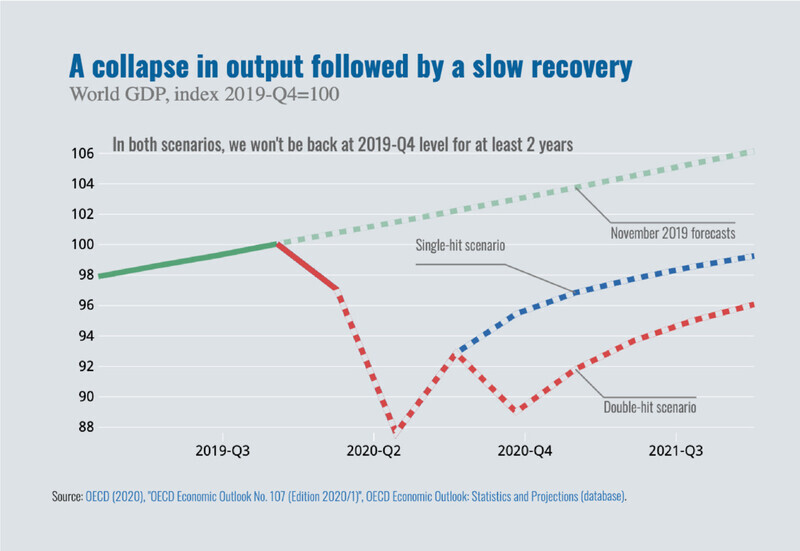hankyoreh
Links to other country sites 다른 나라 사이트 링크
OECD projects growth of -6% globally and -1.2% for S. Korea in 2020

The Organisation for Economic Co-operation and Development (OECD) projected 2020 growth rates of -6.0% for the global economy and -1.2% for the South Korean economy. It also predicted that the rates could worsen to -7.6% for the global economy and -2.5% for the South Korean economy if we see an additional wave of COVID-19 in the fourth quarter.
An “Economic Outlook” report published by the OECD on June 10 considered two scenarios for the fourth quarter of 2020, depending on whether the coronavirus begins spreading again or not. In the first scenario without a renewed spread of the virus, it predicted growth rates of -6.0% this year and 5.2% next year for the global economy. In March 2019, the OECD predicted the global economy would grow by 2.4% in 2020. The project growth rate of -1.2% for South Korea was down by 3.2 percentage points from the 2.0% predicted in March. A growth rate of 3.1% was predicted for next year. The 3.2-percentage point adjustment for South Korea was the smallest among the 20 major economies for which individual outlooks were published (an average of 8.4 percentage points. Other projected growth rates included -7.3% this year and 4.1% next year for the US, -2.6% this year and 6.8% next year for China, -9.1% this year and 6.5% next year for the Eurozone, and -6.0% this year and 2.1% next year for Japan.
For the other scenario in which the coronavirus overtakes the global economy once again in October and November, the OECD predicted growth rates of -7.5% for this year and 2.8% for next year. South Korea’s projected growth rates under this scenario were -2.5% and 1.4%, respectively.
Commenting on South Korea, the OECD said, “Korea was among the first countries hit by COVID-19. Due to an effective strategy to contain the spread of the virus, the government limited the damage to the domestic economy and output is shrinking less than in any other OECD country.”
At the same time, it noted that “private consumption is contracting, as households exercise caution and suffer from income losses” and “unemployment is rising, particularly for non-regular workers.”
By Lee Jeong-hun, staff reporter
Please direct comments or questions to [english@hani.co.kr]

Editorial・opinion
![[Column] Season 2 of special prosecutor probe may be coming to Korea soon [Column] Season 2 of special prosecutor probe may be coming to Korea soon](https://flexible.img.hani.co.kr/flexible/normal/500/300/imgdb/original/2024/0426/3317141030699447.jpg) [Column] Season 2 of special prosecutor probe may be coming to Korea soon
[Column] Season 2 of special prosecutor probe may be coming to Korea soon![[Column] Park Geun-hye déjà vu in Yoon Suk-yeol [Column] Park Geun-hye déjà vu in Yoon Suk-yeol](https://flexible.img.hani.co.kr/flexible/normal/500/300/imgdb/original/2024/0424/651713945113788.jpg) [Column] Park Geun-hye déjà vu in Yoon Suk-yeol
[Column] Park Geun-hye déjà vu in Yoon Suk-yeol- [Editorial] New weight of N. Korea’s nuclear threats makes dialogue all the more urgent
- [Guest essay] The real reason Korea’s new right wants to dub Rhee a founding father
- [Column] ‘Choson’: Is it time we start referring to N. Korea in its own terms?
- [Editorial] Japan’s rewriting of history with Korea has gone too far
- [Column] The president’s questionable capacity for dialogue
- [Column] Are chaebol firms just pizza pies for families to divvy up as they please?
- [Column] Has Korea, too, crossed the Rubicon on China?
- [Correspondent’s column] In Japan’s alliance with US, echoes of its past alliances with UK
Most viewed articles
- 1‘We must say no’: Seoul defense chief on Korean, USFK involvement in hypothetical Taiwan crisis
- 2AI is catching up with humans at a ‘shocking’ rate
- 3[Column] Season 2 of special prosecutor probe may be coming to Korea soon
- 4Division commander ordered troops to enter raging flood waters before Marine died, survivor says
- 5Is Japan about to snatch control of Line messenger from Korea’s Naver?
- 6The dream K-drama boyfriend stealing hearts and screens in Japan
- 7Korea protests Japanese PM’s offering at war-linked Yasukuni Shrine
- 8“Korea is so screwed!”: The statistic making foreign scholars’ heads spin
- 9‘Weddingflation’ breaks the bank for Korean couples-to-be
- 10Korea sees more deaths than births for 52nd consecutive month in February